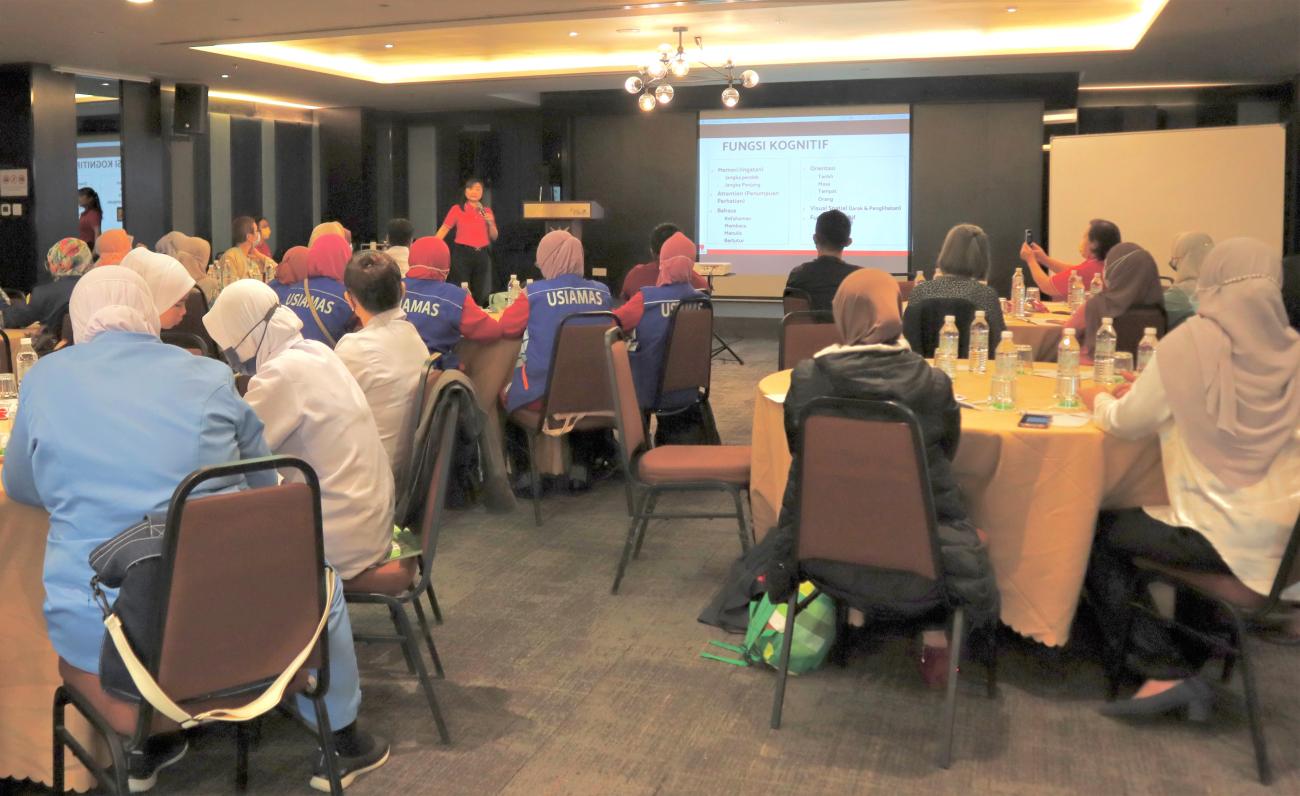Supporting people living with dementia in Malaysia

WHO collaborated with the Ministry of Health Malaysia and the Alzheimer’s Disease Foundation Malaysia to provide Dementia Care Skills training for caregivers
Read the original article by WHO Malaysia, Brunei Darussalam and Singapore here
“She is a little forgetful. She would say to me – you have not come for so long! while I was there a few days earlier. I take photos of us together and the next time I come, I show the photos to her. This calms her down, and then she smiles,” says Dilgeet Kaur A/P Garanan Singh, a caretaker at The Golden Age Welfare Association Malaysia working with older people.
Dilgeet visits them in their homes once a week and helps with daily activities such as shopping and cooking while their children are at work. Some of her clients have difficulties being independent due to problems with mobility or poor vision. Others, show symptoms of early dementia.
“The most difficult to cope with are the mood changes,” says Dilgeet. “It is hard to reassure her sometimes. It helps if I hold her hand and stroke it while telling her how nice her nails look. Just simple physical touches and paying close attention help a lot.”
Dementia is not an inevitable consequence of ageing. It is a syndrome which manifests itself through deterioration of cognitive function, memory loss and changes in behaviour. While dementia is associated with older age, it can also appear in younger people. There is no cure for dementia. However, several factors may reduce the risk of developing dementia, including being physically and socially active, keeping a healthy diet, and avoiding the use of tobacco and excessive alcohol.
It is estimated that around 8.5% of older adults or roughly 260 000 people in Malaysia are living with dementia. Since dementia is a progressive disease, over time a person may need support in their daily activities.
Cheng Siew Ting is a nurse manager at a day centre run by the Alzheimer’s Disease Foundation Malaysia. “Sometimes, it is no longer safe to leave a person with dementia alone at home. Families decide to bring their older family members here while they are at work. We ensure that our members are eating well. We do activities together such as Sudoku or picture colouring. Reminiscence therapy and music can also be beneficial, but it all depends on the individual person.”
As day centres are scarce in Malaysia, many families continue to look after their loved ones at home. “It is important that there are at least two caretakers,” says Cheng. “Familiarity is crucial for people living with dementia. Having two caretakers means that one person can take time off to take care of themselves.”

In some cases, families are not able to provide the support that is needed. Nur Atikah Binti Nizam is an occupational therapist working at Rumah Seri Kenangan, a government-run retirement home. “We have residents with complex health problems who require closer attention. Some residents also show symptoms of dementia. They find it hard to express their feelings. Sometimes they get irritable for no apparent reason.”
“However, even if a person cannot perform daily activities independently, we still try to engage them. I will ask them to help me prepare the meals, and we do simple domestic activities together,” says Nur Atikah. “It is important to continue engaging people in those daily activities, so they can maintain their independence for as long as possible.”
“Sometimes I too, get upset,” admits Dilgeet. “But then I remind myself that the difficult behaviour is caused by the disease. We cannot change the personality of people living with dementia. We need to adapt our own behaviour to match their personality.”
WHO has collaborated with the Ministry of Health Malaysia and the Alzheimer’s Disease Foundation Malaysia to provide Dementia Care Skills training for caregivers from various organizations and facilities in Malaysia, including Dilgeet and Nur Atikah. The training covers knowledge areas, such as behavioural and psychological symptoms of dementia, person-centred care, and advanced care planning, as well as practical skills like effective communication, meaningful engagement, and dealing with challenging behaviours.
The training has been well received and the evaluation of the participant’s knowledge on dementia has shown a marked improvement following the training. Despite the positive impact of this training, it is important to note that a large proportion of people living with dementia in Malaysia are cared for by their families and other informal caregivers, who may not have access to formal training. To fill this gap, WHO has developed iSupport, a training and support manual for carers of people with dementia.





